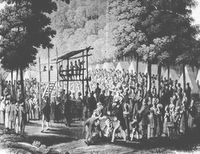
That's a slightly ambiguous blog post title. Fall from grace? Well...maybe there was an aspect of that. Fall from innocence? Yeah, definitely some of that too. But mostly I felt like maybe it was time to fill you in - if you are one of the handful of readers of my blog who don't know me personally - about what's been going on with me this autumn. You may have noticed that I haven't been blogging much. You might have wondered why. Here's where I try to tell a really abbreviated version of that story, for those who might be interested. If you want more detail, you can e-mail me to ask for it, but there's some sensitive stuff involved, so I make no promises. But here are the facts of the story.
In mid-September, my
dear friends lost their son.
Some events surrounding little Will's funeral crystallized for me a realization that I had been coming to for a while: there seem to be some deep-level conflicts between the reality of ministry in an Episcopal Church setting on the one hand, and my heart-deep understanding of the gospel and Christian discipleship - as
I seem to be called to live these things - on the other.
As a result of this realization, I went from being a very active member of the Episcopal Church (and a specific Episcopal church, whose people I continue to love dearly) to being "agnostic" about whether or not I'm an Episcopalian. My good friend Fr. Rick helped me see that I don't have to come down hard on "membership" or lack thereof. So I don't. But practically speaking, I went from being very active and busy in that setting to having relatively few connections with the life of my Episcopal church. Thank God, and thank my wonderful friends: my relationships with my dear friends at that church remain loving, without exception.
This whole series of events was pretty traumatic for me, to be honest. Among other things, I lost twelve pounds in two weeks due to stress and non-intentional fasting.
So, I found myself going from being an active member of two churches to
just one, more or less.
Just a few days after Will's funeral, one of the social workers at
FACETS (where Tina used to work) e-mailed Deanna, one of the leaders of my little church, with an urgent need: a mom with two daughters, age 8 and 13, were facing homelessness that very day if they couldn't find a place to stay for about a month, until they got their Section 8 housing.
Some of the issues that led to my parting of ways with the Episcopal Church had to do with the radical hospitality that I believe is near the heart of the gospel. And my wife, whose heart is much closer to God's than mine is, just naturally opens herself and gives, without needing any trumped-up theological justification. And, though our house is quite small, we had a spare room. So we said yes.
To make a very long story short, this family got the key to their new place a few days ago - into the ninth week of their stay with us. For a variety of reasons, the stress level associated with this living arrangement built steadily, and was nearly unbearable by the end. We had actually decided, for the good of all involved, to stop sleeping in our own house, and had been house-sitting for some friends who were out of town (and to whom we are deeply grateful). The last night before they got their key,
nobody slept in our house except our pets, so concerned were we all to avoid an emotionally unhealthy encounter.
So, in the end, our fumbling attempt at hospitality was a success in that we bridged this family from their previous (precipitously ended) living arrangement to their Section 8 housing. And we definitely learned a
lot that will make us much smarter the next time we do something like this - and about our own naivete and inexperience, and the limits of our strength and tolerance and emotional endurance. My own emotional state is still healing. I'm praying to wake up tomorrow with a little less irrational anxiety clutching my chest - especially since the situation that had been prompting that anxiety is now in the past.
Most of that sounds really heavy - and to be frank, much if it was. These last couple of months have been one of the heaviest periods of my life. But please understand: none of this has really dented my faith. In fact, my faith - along with my family, and my incredible, caring, supportive friends in two church communities - have helped me to get through this time much more "whole" than was the case in previous, similarly heavy periods of my life. And even now, when my heart is still healing, I'm really not having trouble seeing the hand of God in all of this. All of it. Even though many of the workings of that hand remain a mystery to me. And (regarding that mystery), I wouldn't want it any other way. Which is not to say it isn't hard sometimes.
So here's the bright core of a heavy story. At the same time all of this has been going on, a realization has been slowly dawning on me. This is it: my wildest dreams, and my fondest dreams, seem to have an amazing amount in common with the dreams and the life of my little church,
the Common Table. And as the people of this church, my dear friends, have supported and cared for Tina and me through this fall (and, to a much smaller degree, we've been able to support and care for them) - and as I've seen my church-phobic wife become an integral part of this church community - I've realized that my love for these people is stronger than anything else in my life, except my love for Tina.
I've realized that, in being a part of this community of disciples of Jesus, I'm doing what I've always wanted to do, being what I've always wanted to be, and doing it alongside my wife, which is something I'd sort of stopped dreaming of. This sense of call I've been trying to discern for nearly the past four years - I can't conceive of a better place to live it out than here, among these people. So, on this Thanksgiving day (OK, it ended about an hour ago) following this extremely challenging autumn, I am more deeply and thoroughly thankful to our loving God than I have ever been in my life. (And if I'm not, then I bloody well should be.)
Thank you, God, and please help me to become a better servant. And thank you - so much - for surrounding me with such an incredible community of people to grow, learn, and serve together with. Amen.
UPDATE: I made one tiny edit above. If you're clever enough to spot it (which seems unlikely), please note that it was late when I wrote this, and I really, truly meant to phrase that sentence differently in the first place - I was surprised to go back and read it and see that I really had written it that way. No, I'm not going to tell you, but suffice it to say that, in math, some operators are definitely not commutative, so it behooves one to point them in the right direction. :-)
 Hey all, if you happen to subscribe to my blog's feed (in Bloglines or the like), it has come to my attention (thanks, StaplerDude!) that my feed's URL changed when I upgraded to the new Google/Blogger thingy. If you were subscribed to my FeedBurner feed (http://feeds.feedburner.com/RudeArmchairTheology), you should automagically get the new feed. If you were subscribed to my unBurned Blogger feed (http://mcroghan.blogspot.com/atom.xml), you might not be seeing updates. So, if you want to subscribe, please switch over to the FeedBurner feed, and I'll try to make sure it always points at the right thing.
Hey all, if you happen to subscribe to my blog's feed (in Bloglines or the like), it has come to my attention (thanks, StaplerDude!) that my feed's URL changed when I upgraded to the new Google/Blogger thingy. If you were subscribed to my FeedBurner feed (http://feeds.feedburner.com/RudeArmchairTheology), you should automagically get the new feed. If you were subscribed to my unBurned Blogger feed (http://mcroghan.blogspot.com/atom.xml), you might not be seeing updates. So, if you want to subscribe, please switch over to the FeedBurner feed, and I'll try to make sure it always points at the right thing.

















